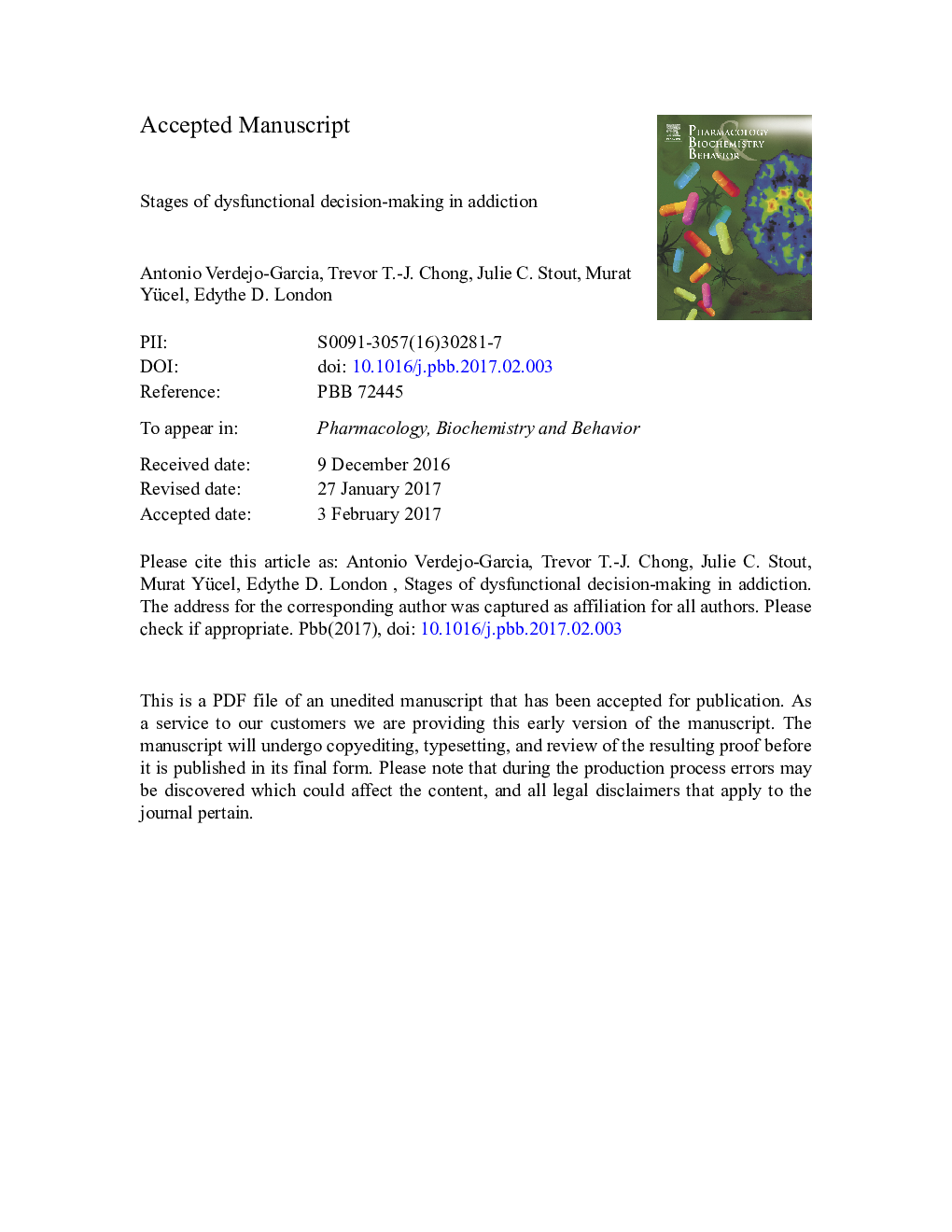| کد مقاله | کد نشریه | سال انتشار | مقاله انگلیسی | نسخه تمام متن |
|---|---|---|---|---|
| 8350096 | 1541823 | 2018 | 28 صفحه PDF | دانلود رایگان |
عنوان انگلیسی مقاله ISI
Stages of dysfunctional decision-making in addiction
ترجمه فارسی عنوان
مراحل تصمیم گیری ناکارآمد در اعتیاد
دانلود مقاله + سفارش ترجمه
دانلود مقاله ISI انگلیسی
رایگان برای ایرانیان
ترجمه چکیده
استفاده از مواد مخدر یک انتخاب با نتایج مثبت فوری است، اما پیامدهای منفی طولانی مدت است. بنابراین استفاده مداوم از داروها در مواجهه با عواقب منفی، اختلال عملکرد مکانیسم های شناختی را که بر اساس تصمیم گیری می باشد، نشان می دهد. این اختلال شناختی را می توان به سه مرحله بندی کرد: تشکیل ترجیحات شامل ارزیابی گزینه های تصمیم گیری؛ اجرای انتخابی از جمله انگیزه، خود تنظیم و فرآیندهای مهارکننده؛ و پردازش بازخورد به دنبال تقویت یادگیری است. در این مقاله، مطالعات رفتاری بررسی شده است که تغییرات در این سه مرحله تصمیم گیری را در افراد مبتلا به اختلالات مصرف مواد مورد بررسی قرار داده است. نسبت به افراد سالم، افراد مبتلا به اختلالات مصرف الکل، شاهدانه، محرک و مخدر ارزش انتخاب های خطرناک بیشتر در طول تشکیل تنظیمات؛ اشتیاق بیشتر برای پاداش های جذاب جذاب در طول اجرای انتخاب؛ و هر دو کارآمدتر در یادگیری از پاداش هستند و کمتر کارآمد در یادگیری از تلفات در هنگام پردازش بازخورد. این نقص تصمیم گیری مشاهده شده به احتمال زیاد به علت عوامل پیشروبید و اثرات ناشی از مواد مخدر است. از آنجایی که نقص تصمیم گیری به طور چشمگیری با ریسک بیشتر عود بیماری مرتبط است، ما از تحقیقات بیشتر در زمینه تعدیل مراحل مولکولی که باعث اختلال تصمیم گیری در اختلالات اعتیاد می شوند حمایت می کنیم.
موضوعات مرتبط
علوم زیستی و بیوفناوری
بیوشیمی، ژنتیک و زیست شناسی مولکولی
زیست شیمی
چکیده انگلیسی
Drug use is a choice with immediate positive outcomes, but long-term negative consequences. Thus, the repeated use of drugs in the face of negative consequences suggests dysfunction in the cognitive mechanisms underpinning decision-making. This cognitive dysfunction can be mapped into three stages: the formation of preferences involving valuation of decision options; choice implementation including motivation, self-regulation and inhibitory processes; and feedback processing implicating reinforcement learning. This article reviews behavioral studies that have examined alterations in these three stages of decision-making in people with substance use disorders. Relative to healthy individuals, those with alcohol, cannabis, stimulant and opioid use disorders value risky options more highly during the formation of preferences; have a greater appetite for superficially attractive rewards during choice implementation; and are both more efficient in learning from rewards and less efficient in learning from losses during feedback processing. These observed decision-making deficits are most likely due to both premorbid factors and drug-induced effects. Because decision-making deficits have been prospectively associated with a greater risk of drug relapse, we advocate for greater research on modulating the component stages that give rise to dysfunctional decision-making in disorders of addiction.
ناشر
Database: Elsevier - ScienceDirect (ساینس دایرکت)
Journal: Pharmacology Biochemistry and Behavior - Volume 164, January 2018, Pages 99-105
Journal: Pharmacology Biochemistry and Behavior - Volume 164, January 2018, Pages 99-105
نویسندگان
Antonio Verdejo-Garcia, Trevor T.-J. Chong, Julie C. Stout, Murat Yücel, Edythe D. London,
